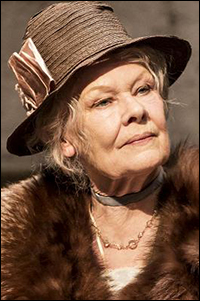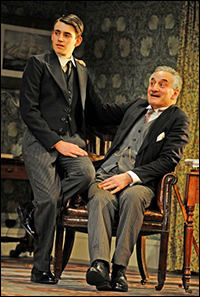
*
It's becoming harder and harder to tell London and New York apart, theatrically speaking. We got Once, you got Matilda. We got the new Bruce Norris play at the Royal Court, you got the Royal Shakespeare Company's Julius Caesar. One Man, Two Guv'nors from here, The Book of Mormon from there, and, in return for those fabulous opera broadcasts from the Met, we've been sending you some pretty sensational presentations from our National Theatre. Is there no end to it? Well, oddly enough, I think there is. There are still some things on our stages here in the West End that may not translate to Broadway with any comparative success or comparable comprehension.
Several years ago a wonderful play by Michael Frayn, Democracy, lauded and covered with plaudits in London, was met with blank stares and almost universal verdicts of "booooooring" from New York critics and knowledgeable theatregoers alike. The problem lay both in its subject matter—Germany under Chancellor Willy Brandt (who cares?)—and the fact that in the West End, each of the "men in suits" who ran his government was played as a recognizable English type, complete with regional and class accent and clothes. In America, where accents identify location rather than class, the differences between the men, all of whom wore suits, were not discernible, and the play was therefore an endless succession of lookalikes and sound-alikes instead of an endlessly fascinating ballet of constantly moving political events.
I fear that three of the best plays currently on London stages might suffer the same fate were they to transfer to Broadway, although they're so fine in both content and production that I'd love for the New York audience to enjoy them. No, not The Audience, which we discussed last month, in which Helen Mirren as the Queen has a series of conversations with her prime ministers.
I refer to This House, which I suspect would be incomprehensible to anyone not intimately familiar with the parliamentary system of government. One of the characters, a very minor character, is the late Margaret Thatcher, struggling to obtain the leadership of the Conservative Party as a young—well, young-ish—Member of Parliament. And all the people on stage, although played by actors, are real politicians, to the extent that politicians may be described as real. This House, by James Graham, deals with the day-to-day events in a real British crisis, the hung Parliament of 1974–79, when no single party had a majority to govern and the Labour Party and the Conservative Party fought it out over the teacups and sweet biscuits. So narrow were the margins in each vote that, on occasion, Members were carried in on hospital beds because their vote might make the difference to winning or losing the issue. Two Members actually died during this strange interlude and two others took their own lives from the stress.
 |
||
| Judi Dench in Peter and Alice. |
||
| Photo by Johan Persson |
Not perhaps quite as good a play, but blessed with the best performances in London, is Peter and Alice by John Logan, the author of Red. It could be argued that with the combination of Judi Dench and Ben Whishaw, the content might as well be the London telephone directory read aloud, but it's much more than that. Again, we're looking at two real people as portrayed by two of the best actors on the English stage. The year is 1932. Mrs. Alice Hargreaves—an old, old lady in a fur tippet and sensible shoes—waits in a publishing house storeroom for the opening of a Lewis Carroll exhibition, at which she is guest of honour. Her host is a young man who introduces himself as Peter Davies.
The meeting is not a success. She is waspish and unwilling to tolerate sycophantic small talk. He is shy and awkward. But she is no ordinary Alice and he no ordinary Peter, for we are looking at the original Alice in Wonderland and the original Peter Pan. These iconic symbols of perpetual childhood have grown up, and this is not what either of their progenitors intended. Lewis Carroll's passion for the beautiful ten-year-old Alice Liddell and J.M. Barrie's obsession with all the brothers of Peter Llewellyn Davies were the essence of what they both wanted childhood to be, a mixture of adventure and enchantment, leavened with freedom, love and security. Neither of the writers nor their literary progeny was to achieve any of these.
While both Peter Pan and Alice in Wonderland are read and studied in the United States, it is difficult to overestimate their importance in the British, specifically, the English psyche. Separated by 40 years, both works are emblematic of the exact moment when the sun always shone and the British Empire was transcendent, the years before the First World War destroyed an entire generation of young men and, with it, all hope for the future. In order for our world to make sense, we want Peter and Alice to go on exactly as they were when we first met them, unchanged by time, untouched by war or recession or greedy bankers. What we don't want is for them to grow up.
 |
||
| Charlie Rowe and Henry Goodman in The Winslow Boy. |
||
| Photo by Nobby Clarke |
Peter and Alice is the second production in the first season of the Michael Grandage Company, so far wildly successful, with a cast, as they say, to die for. Later we get Daniel Radcliffe in Martin McDonagh's bleakly, blackly funny The Cripple of Inishmaan, this year's Hedda Gabler; Sheridan Smith with David Walliams in Shakespeare's A Midsummer Night's Dream; and Jude Law as Henry V. The first was a stunning, and stunningly funny, production of Peter Nichols' Privates on Parade starring the inimitable Simon Russell Beale, which won all possible awards. If Grandage continues as he's started, this is going to be the theatrical year of the century.
Terence Rattigan may have been overlooked for years in the wake of the "Angry Young Men" plays, considered old-fashioned, and miserable about his sexuality, but he wrote some wonderful plays and, in a way, it is only now that we are beginning to appreciate the contribution he made to the theatrical literature with The Browning Version, Man and Boy, The Deep Blue Sea, Separate Tables, and many others; perhaps most of all by the one currently at the Old Vic, The Winslow Boy. He wrote, perhaps better than any other playwright except Shakespeare, about the relationships between men—brothers, fathers, and sons; older and younger; even friends, although there are no gay characters in his plays.
Rattigan believed in craftsmanship, in making plays which would stand the test of time, and in The Winslow Boy, he took the true story of the boy who may, or may not, have stolen a five shilling postal order from a schoolmate at his military school, to examine the whole question of male identity and its confusion at different ages and what it means to be a man. It is, after all, only about a boy from a privileged home and his father's insistence on vindicating him from this petty charge, which grows into a major court case, complete with defense from a Queen's Council barrister. The case not only impoverishes his family but also reveals Rattigan's central concern with human rights and his belief in justice at all costs.
He was a marvel of a playwright, in this case matched by Lindsay Posner's production and Henry Goodman's performance as the father in tandem with Peter Sullivan's as the QC. (Ruth Leon is a London and New York City arts writer and critic whose work has been seen in Playbill magazine and other publications.)
Check out Playbill.com's London listings. Seek out more of Playbill.com's international coverage, including London correspondent Mark Shenton's daily news reporting from the U.K.










